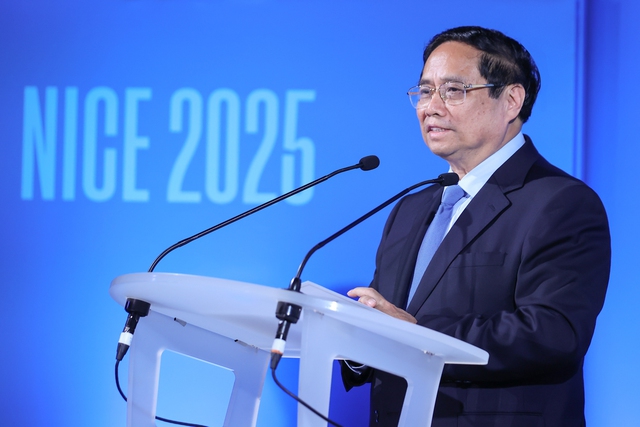Prime Minister Pham Minh Chinh calls for united global action to protect delta regions
VGP - Prime Minister Pham Minh Chinh has called for united global action to protect delta regions while addressing the Deltas of the World Summit in Nice, France on June 9.

Prime Minister Pham Minh Chinh addresses the Deltas of the World Summit in Nice, France, June 9, 2025. Photo: VGP
Viet Nam considers adaptation to climate change in delta regions not only an urgent and objective requirement but also a historic mission. It is about protecting water resources, safeguarding natural conditions, and adapting to deltas in harmony with nature, said Prime Minister Pham Minh Chinh.
Pham said that delta regions are crucial crossroads between humans and nature, between upstream and downstream, and between land and sea, thus strong cooperation is essential, or the global community risks shared consequences.
This is not merely a demand of daily life, but a historic responsibility, as well as a nation's duty to a shared river, to the use of transboundary water resources, he stressed.
With the guiding principle of “living in harmony with nature” and the criterion of “mutual benefit and multi-purpose,” he said, Viet Nam is focusing on the coordinated and effective implementation of strategies, policies, and solutions to mobilise resources and invest in infrastructure systems to protect the integrity of nature.
The country aims to strengthen resilience and adaptive capacity to climate change, promote transboundary cooperation, and protect water resources and aquatic biodiversity. At the same time, it seeks close cooperation and support from development partners and international organisations to ensure effective development and sustainable exploitation.
He went on to say, Viet Nam continues to take a proactive and active role, working closely with other countries and regions to achieve the dual goals of contributing to global food security and striving to reduce greenhouse gas emissions worldwide. Since climate change affects every country, every individual, and every sector, it requires an inclusive, comprehensive, and global, approach, he stated.
To this end, he underlined the need to proactively plan long-term, inter-regional and inter-sectoral strategies to transform the development model of delta regions from passive response to flexible adaptation to climate change. This transformation should shift from reactive to proactive, from single-sector to multi-sector approaches, putting people and businesses at the center as key actors, with a focus on creating jobs, ensuring livelihoods, and maintaining inclusive and holistic development.
Viet Nam also seeks to actively preserve and promote indigenous knowledge in combination with the application of scientific and technological achievements, digital transformation, and artificial intelligence, especially in areas such as forecasting, risk warning, mapping, and designing livelihood transition solutions adapted to climate change, he said.
The Prime Minister also proposed strengthening international cooperation through an effective global delta network, with a focus on technology transfer, information sharing, and experience exchange.
Viet Nam will proactively establish and effectively implement sustainable, fair, and inclusive financial mechanisms, enabling access to green finance for development, he said, adding that the country will actively develop flexible, reasonable, and effective standards, regulations, and codes of conduct for delta regions.
In conclusion, he called for united global action to protect delta regions, adapt to climate change in harmony with nature, and ensure sustainable, inclusive development that benefits all people and future generations.
Viet Nam has two key delta regions – the Red River Delta and the Mekong Delta. The Red River Delta is home to 22% of the country’s population, boasts a 4,000-year-old wet rice civilisation, and contributes nearly 30% of national GDP. Meanwhile, the Mekong Delta is the country’s largest rice granary that produces 50% of the country’s rice and 90% of its rice exports.
The country is undertaking a pilot project to grow 1 million hectares of high-quality, low-emission rice, supporting global food security.
The summit was held in Nice, France, on the sidelines of the 3rd United Nations Ocean Conference (UNOC 3), and co-chaired by the leaders of Viet Nam and Iraq./.

